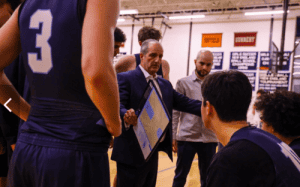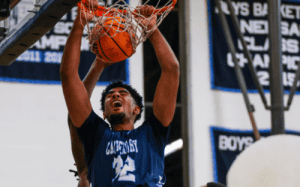Prep School Reclassing: What Families Need to Know Before Making the Move
Reclassing has become one of the most misunderstood — and overused — decisions in prep school basketball.
We dug into the truth with Coach Brian Fruscio, longtime prep coach and head of the Canterbury School basketball program, who’s helped countless players navigate whether to reclass, repeat, or pursue a post-grad year.
Coach Fruscio breaks down the academic realities, athletic impacts, and recruiting consequences of reclassing — from the perspective of someone who’s lived it with his own players and family.

Canterbury School’s Brian Fruscio leads his team through a timeout, focusing on preparation, communication, and in-game leadership.
Understanding Reclassing in Prep School Basketball
Cory: Brian, I get this question all the time. Parents call about reclassing — whether their child should repeat a grade, take a PG year, or just stay on track. How do you explain it?
Brian: “They can’t graduate from here and then post-grad, so that’s not an option. What I’d say if they’re in limbo — come in as a 10th or 11th grader, and in the first couple months, they’ve got to make a decision.”
Brian: “They could decide to reclass before graduation. We have enough electives to make that possible. My own son did that — he came as an 11th grader, got injured, and did two junior years and a senior year. It worked for him.”
Brian: “If they’re dipping their toe, there are options. But personally, I like people who go to the end of the pool and jump in.”
When Reclassing Makes Sense — and When It Doesn’t

Canterbury School coach Brian Fruscio explains the realities of reclassing in prep basketball—why timing, maturity, and competitiveness matter more than age.
Brian: “Of course, as you well know, the level of talent creates the level of opportunities. If we have a real, real good one and a real, real tall one, we always say higher education — the higher they are, the more we want to educate them.”
Brian: “We want to coach good kids. We want low maintenance at its height. We want no maintenance if possible. And that’s what college coaches want too.”
Cory: So maturity plays a big role in whether it’s worth reclassing.
Brian: “Definitely. Those reclass juniors are the key to your success as a school and as a team. They get that extra year of strength, growth, and accountability that a lot of college freshmen wish they had.”

Canterbury School celebrates its student-athletes on College Signing Day as they officially commit to their next academic and athletic chapters.
Reclassing vs. Post-Grad: What’s the Difference?
Cory: So what’s your take on reclassing versus doing a PG year?
Brian: “If you’ve already graduated, PG is your only path. But if you’re still in high school and think you need more time, reclassing can be that bridge.”
Brian: “The big difference is how much you still have to give — academically and athletically. If a kid needs to grow physically and emotionally, I’ll always prefer a reclass year. But if you’re already a senior ready to go, a PG year is perfect.”
Cory: Makes sense — a lot of players see reclassing as a setback, when it’s really a setup for success.
How Reclassing Impacts Recruiting and College Readiness

A Canterbury School player throws down a powerful dunk during prep school competition, capturing the athletic energy and excitement of the game.
Brian: “You can’t just reclass and expect recruiting to happen. You’ve got to compete. We talk about it all the time — if you play poorly, you’re exposed. If you play great, you get exposure.”
Brian: “Families need to understand that competing is the separator. Playing hard is the price of admission — but true competing catches college coaches’ eyes.”
Cory’s Takeaway — It’s About Readiness, Not Age
Too many families view reclassing as a shortcut to recruiting, when it’s really a test of readiness.
If you use the extra year to mature academically, learn discipline, and compete harder, it can be transformational. But if it’s just about getting older, the opportunity will pass you by.
If you’re looking into prep school, reach out to us at PREP Athletics. We’re here to help you explore your potential and make choices that align with your athletic and academic future. We’ve also got a long list of resources to get you started in the right direction, so check out our latest prep basketball updates on YouTube or our podcast to dive deeper.
